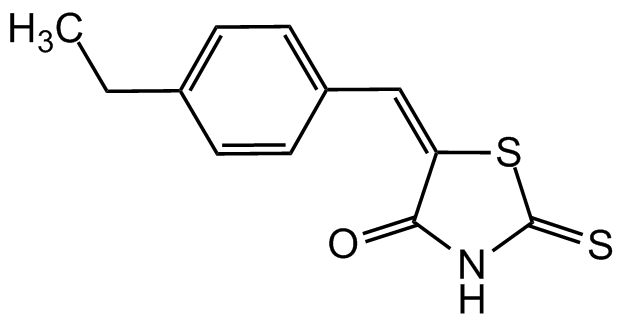5-[(4-Ethylphenyl)methylene]-2-thioxo-4-thiazolidinone
| Code | Size | Price |
|---|
| CDX-E0533-M005 | 5 mg | £59.00 |
Quantity:
| CDX-E0533-M025 | 25 mg | £157.00 |
Quantity:
Prices exclude any Taxes / VAT
Overview
Regulatory Status: RUO
Shipping:
AMBIENT
Storage:
Short Term: +20°C, Long Term: +4°C
Images
Documents
Further Information
Alternate Names/Synonyms:
10058-F4
Appearance:
Yellow to dark yellow powder.
CAS:
403811-55-2
EClass:
32160000
Form (Short):
liquid
GHS Symbol:
GHS07
Handling Advice:
Protect from light and moisture.
InChi:
InChI=1S/C12H11NOS2/c1-2-8-3-5-9(6-4-8)7-10-11(14)13-12(15)16-10/h3-7H,2H2,1H3,(H,13,14,15)/b10-7+
InChiKey:
SVXDHPADAXBMFB-JXMROGBWSA-N
Long Description:
Chemical. CAS: 403811-55-2. Formula: C12H11NOS2. MW: 249.35. c-Myc is a proto-oncogene that plays an important role in cell proliferation, differentiation, and apoptosis. 5-[(4-Ethylphenyl)methylene]-2-thioxo-4-thiazolidinone [10058-F4] is a cell-permeable thiazolidinone compound that specifically inhibits the c-Myc-Max interaction/dimerization at 64 µM, preventing c-Myc-dependent gene expression and cell proliferation. 10058-F4 inhibits tumor cell growth and proliferation in a c-Myc-dependent manner both in vitro and in vivo. 10058-F4 induces cell-cycle arrest (G0/G1 phase) and apoptosis. 10058-F4 has been found to also upregulate cyclin-dependent kinase (CDK) inhibitors, p21 and p27. In addition to c-Myc, 10058-F4 inhibits the nuclear Myc protein, N-Myc, at 50 µM, inducing arrest, apoptosis, and differentiation in neuroblastoma cells overexpressing the gene for N-Myc. This compound can be used to delineate novel actions of Myc proteins, especially those related to lipid and glucose metabolism. 10058-F4 downregulates human telomerase reverse transcriptase and enhances chemosensitivity in several human cancer cell lines.
MDL:
MFCD00758517
Molecular Formula:
C12H11NOS2
Molecular Weight:
249.35
Package Type:
Vial
Precautions:
P280-P305 + P351 + P338
Product Description:
c-Myc is a proto-oncogene that plays an important role in cell proliferation, differentiation, and apoptosis. 5-[(4-Ethylphenyl)methylene]-2-thioxo-4-thiazolidinone [10058-F4] is a cell-permeable thiazolidinone compound that specifically inhibits the c-Myc-Max interaction/dimerization at 64 µM, preventing c-Myc-dependent gene expression and cell proliferation. 10058-F4 inhibits tumor cell growth and proliferation in a c-Myc-dependent manner both in vitro and in vivo. 10058-F4 induces cell-cycle arrest (G0/G1 phase) and apoptosis. 10058-F4 has been found to also upregulate cyclin-dependent kinase (CDK) inhibitors, p21 and p27. In addition to c-Myc, 10058-F4 inhibits the nuclear Myc protein, N-Myc, at 50 µM, inducing arrest, apoptosis, and differentiation in neuroblastoma cells overexpressing the gene for N-Myc. This compound can be used to delineate novel actions of Myc proteins, especially those related to lipid and glucose metabolism. 10058-F4 downregulates human telomerase reverse transcriptase and enhances chemosensitivity in several human cancer cell lines.
Purity:
>95% (NMR)
SMILES:
O=C(NC(S/1)=S)C1=C/C2=CC=C(CC)C=C2
Solubility Chemicals:
Soluble in DMSO (25mg/ml), ethanol (5mg/ml) or water (1mg/ml).
Transportation:
Non-hazardous
UNSPSC Category:
Biochemical Reagents
UNSPSC Number:
12352200
Use & Stability:
Stable for at least 2 years after receipt when stored at +4°C.
References
(1) X. Yin, et al.; Oncogene 22, 6151 (2003) | (2) M.J. Huang, et al.; Exp. Hematol. 34, 1480 (2006) | (3) C.P. Lin, et al.; Anticancer Drugs 18, 161 (2007) | (4) J. Guo, et al.; Cancer Chemother. Pharmacol. 63, 615 (2009) | (5) P. Zhang, et al.; Mol. Endocrinol. 24, 1274 (2010) | (6) H. Zirath, et al.; PNAS 110, 10258 (2013) | (7) M. Zhang, et al.; Biomed. Pharmacother. 73, 123 (2015) | (8) M. Lv, et al.; Mol. Med. Rep. 18, 421 (2018) | (9) N. Sheikh-Zeineddini, et al.; J. Cell Biochem. 120, 14004 (2019) | (10) N. Sheikh-Zeineddini, et al.; Eur. J. Pharmacol. 870, 172821 (2020)



